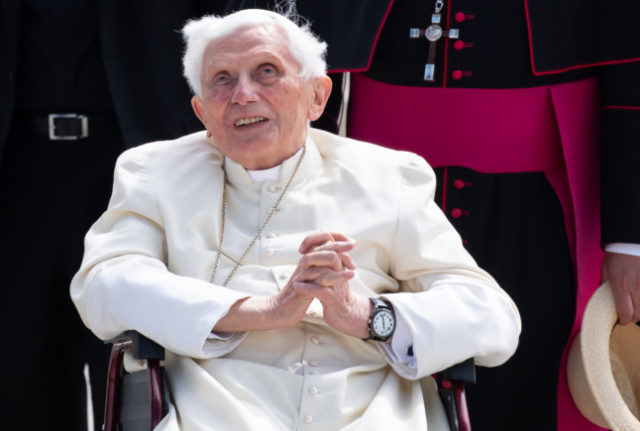Benedict — who was the archbishop of Munich and Freising from 1977 to 1982 — has “strictly” denied any responsibility, said lawyer Martin Pusch of Westpfahl Spilker Wastl (WSW), which was commissioned by the church to carry out the probe.
But the experts do not consider this credible, Pusch said.
Benedict, 94 — whose civilian name is Josef Ratzinger — in 2013 became the first pope to step down from the role in 600 years and now lives a secluded life in a former convent inside the grounds of the Vatican.
Vatican spokesman Matteo Bruni emphasised that it must still examine the report, “the contents of which are not currently known”, but reiterated the Vatican’s “sense of shame and remorse for the abuse of minors committed by clerics”.
Two of the cases where Benedict allegedly failed to act involved clergymen who had committed several proven acts of abuse but were allowed to continue with pastoral duties, Pusch said.
An interest in the abuse victims was “not recognisable” in Benedict, he said.
In one case, a now notorious paedophile priest named Peter Hullermann was transferred to Munich from Essen in western Germany where he had been accused of abusing an 11-year-old boy.
Hullermann was reassigned to pastoral duties despite his history and continued to reoffend for many years.
READ ALSO: Ex-pope Benedict under scrutiny in German child abuse probe
‘Defensive attitude’
Pusch said Benedict had initially shown a “defensive attitude” when responding to questions for the investigation. However, he later changed his attitude and gave a detailed written statement.
The Munich report, which examined the years 1945 to 2019, found indications of sexually abusive behaviour in 235 people it investigated, including 173 priests.
The lawyers also accused Cardinal Reinhard Marx, the current archbishop of Munich and Freising, of failing to act in two cases of suspected abuse.
Marx had last year offered Pope Francis his resignation over the church’s “institutional and systemic failure” in its handling of child sex abuse scandals.
However, Pope Francis rejected his offer, urging the cardinal known for his reforms to stay and help shape change in the Catholic Church.
‘Frightening insights’
The reformist Catholic group “Wir sind Kirche” (We are Church) said the report offered “frightening insights into the lack of sense of responsibility of clerical office holders”.
It called on Benedict to “face up to his ecclesiastical and moral responsibility instead of making more and more denials that are not very credible”.
The Catholic Church has been embroiled in a series of sexual abuse scandals in countries around the world, including Australia, Chile, France, Ireland and the United States.
In Germany, a string of reports in recent years have exposed widespread abuse of children by clergymen.
READ ALSO: German bishop resigns over Catholic church’s ‘failure’ in abuse scandal
A study commissioned by the German Bishops’ Conference in 2018 concluded that 1,670 clergymen in the country had committed some form of sexual attack against 3,677 minors between 1946 and 2014.
However, the real number of victims is thought to be much higher.
Another report published last year exposed the scope of abuse committed by priests in Germany’s top diocese of Cologne.
The abuse scandal has thwarted the Catholic Church’s efforts to spearhead broad reforms in Germany.
It counted 22.2 million members in 2020 and is still the largest religion in the country, but the number is 2.5 million fewer than in 2010 when the first major wave of paedophile abuse cases came to light.
Payouts for victims of abuse were increased in 2020 to up to 50,000 euros ($56,700), from around 5,000 euros previously, but campaigners say the sum is still inadequate.
Matthias Katsch, a spokesman for the Eckiger Tisch victims’ group, called the report “shocking”.
It was “impressive and very moving” to see the lawyers “take apart this edifice of lies that has been erected to protect Benedict XVI”, he said.
By Ralf ISERMANN with Femke COLBORNE in Berlin




 Please whitelist us to continue reading.
Please whitelist us to continue reading.
Holy scum from HELL- to put it kindly